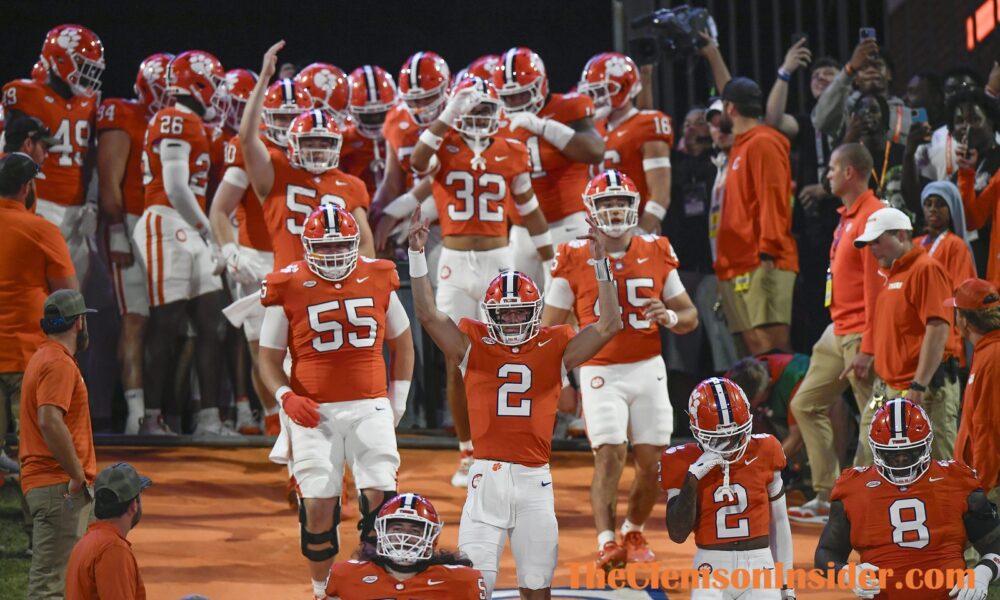CLEMSON — No matter how much the recruiting landscape changes, Clemson is determined to not only stay true to its values but prove it can compete at the highest levels while doing so.
For General Manager Jordan Sorrells, that is a tough balancing act. With recruiting having become increasingly driven by money, the Tigers’ vetting process becomes that much more crucial.
Now that the House Settlement has been finalized and in place, Sorrells is hopeful that the sport is on the verge of experiencing more stability than it has seen in recent years.
“It has changed the game,” Sorrells said during Clemson’s annual media outing. “We are hopeful that we are going to get some clarity and some more regulation, rules, structure, but those are decisions that are made at a really, really high level.
“Concrete rules and structure would help not only me, but everybody across the landscape. Just to know the rules of the game that you are playing. We are two weeks into the settlement, so we still have some runway ahead of us.”
With the settlement came a new revenue-sharing model, which adds another layer to the recruiting process. Not only is the staff tasked with finding the right fits, but they must also factor in worth and value, as schools operate under a strict salary cap when it comes to the revenue-sharing side of the equation.
While there was certainly an adjustment period that led to some challenges, Sorrells believes Clemson is in a good spot moving forward.
“It has professionalized it in a lot of ways,” Sorrells said. “It has certainly changed perspectives on decision-making and those kinds of things, but at the end of the day, what is important for us is we need to adapt, and I think we have adapted. But we don’t need to compromise.”
One area the Tigers have excelled is roster retention. Clemson didn’t have one impact player enter the transfer portal after last season.
Make no mistake, players like Cade Klubnik, Peter Woods and TJ Parker, just to name a few, absolutely could have elected to transfer out in an effort to seek better financial opportunities elsewhere. All could have likely secured better deals, seeing how at the time, so many teams were frontloading deals to try and get ahead of the settlement that went into effect on July 1.
However, all of those players chose to stay, and that speaks volumes about the culture in place inside the program and how well this staff has identified which players are the best fits. It also speaks to the job Sorrells has done behind the scenes.
“In terms of philosophy and what is most important to us, those things still need to remain the same,” Sorrells said. “That is where we have been unique, and I think we are going to continue to be unique. As long as Coach Swinney is here, and our staff is in place, we are still going to value things we have always valued at Clemson. But we have to adapt along with the changes of college athletics, and that has been the fun part for me. Understanding and learning that we can still do it the Clemson way in a new era of college sports.”
Another thing being seen in this new era is more parity. Just look at some of the moves schools like Georgia Tech and Texas Tech have been able to make. Even Duke was able to flip a blue-chip defensive line recruit who was committed to Clemson in the last recruiting cycle. In the previous era, the chances of that happening were somewhere between slim and none.
For Sorrells and the rest of the staff at Clemson, that is just one more challenge faced. Particularly since this new revenue-sharing model is still in the beginning stages. However, once things stabilize, and Sorrells believes they will, he thinks the sport might be headed towards more parity than it’s seen in quite some time.
“I think we are in the process of that happening, but I don’t think we are there yet just because, again, I don’t think we have all the answers to all the questions,” Sorrells said. “I have a laundry list of questions that I would love to have answered, just relative to how will this work? What can we do, what can’t we do? Just have some concrete answers on that, which we don’t have yet. But I think we are in the process of the playing field being leveled.”
